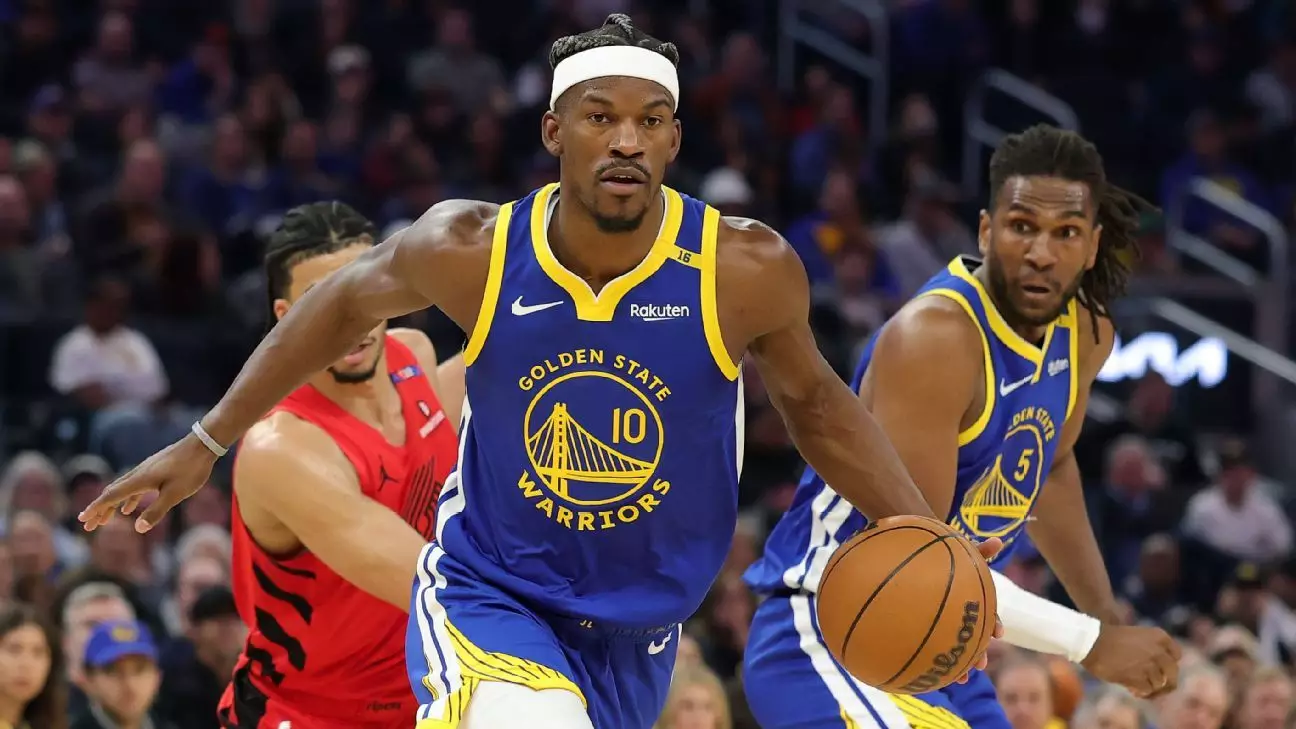Jimmy Butler’s trajectory in the NBA has always captivated fans and analysts alike, not only for his on-court antics but also for the deeply personal narratives that accompany his achievements. The former Miami Heat star, now emboldened in the Golden State Warriors’ lineup, approaches his return to Miami for a mid-season clash with an air of detachment and professionalism. To Butler, this upcoming match is not a garden of memories, but simply “another game.” His ability to compartmentalize his emotions illustrates a resilience often required in the highly volatile realm of professional sports.
In his post-game comments following a loss to the Atlanta Hawks, Butler emphasized a remarkable mindset: the past is behind him, and his focus is firmly on the present and future. After moving through different teams — the Chicago Bulls, Philadelphia 76ers, and Minnesota Timberwolves — Butler learned early on that the sentimentality of returning to former haunts can become a distraction. Instead, he adopts a philosophy of focusing solely on the game’s trajectory and his role in it. This mental fortitude is something that any aspiring athlete should aspire to emulate.
The Fallout from the Trade
Butler’s tenure with the Miami Heat culminated in a bitter departure that left fans and analysts pondering the reasons behind his exit. Still, it’s fascinating to dissect the aftermath. Since the trade, Miami has faced a staggering decline, posting a dismal 4-17 record, leading to a notorious 10-game losing streak. This contrast brings to light an unpleasant reality: while Butler and the Warriors thrive with a formidable record post-trade, Miami appears to be crumbling under the weight of expectations.
As Butler approaches this game in Miami, the audacity of declaring it just “another game” becomes poignant when juxtaposed with the Heat’s current struggles. This situation sparks intriguing conversations about how the dynamics of individual players can significantly impact team performance. Was it just Butler’s presence in Miami that fueled their success, or does his departure reveal deeper fissures within the Heat’s current roster? There’s an undeniable complexity in how the era of Butler in Miami is coming to an end—almost as if the team has to confront the ghost of a title that was never claimed.
Understanding Loyalty and Performance
Amid discussions of loyalty and former allegiances, Butler’s poised comments reflect an understanding that sports is an eternal cycle of evolution and re-evaluation. The loyalty he expresses toward his current team, the Warriors, is as earnest as it is strategic. Butler’s decision to shift his focus solely to winning with Golden State exemplifies a crucial lesson for aspiring athletes and fans alike: the importance of being able to let go, both for one’s mental health and for professional legacy.
Draymond Green’s remarks about the game being significant for both Butler and Andrew Wiggins—who also transitioned teams during the trade—underline the multi-faceted nature of such encounters. There’s a palpable tension brewing for both sides, as the Warriors are expected to rally behind Butler, while the Heat may see Wiggins as a personification of what they’ve lost. The emotional layers that accompany such matchups cannot be ignored, yet Butler insists on relegating those feelings to the background.
A Game Beyond the Scoreboard
While basketball is often reduced to numbers and stats, Butler’s approach to this game sheds light on the inherent complexities of sport as a career. His comment emphasizing that the game against Miami is critical, yet merely another step toward the ultimate goal—winning a championship—reflects an unwavering determination to focus on the task at hand.
Whether Butler is greeted with euphoria or ire from Miami fans remains to be seen, but his ability to redirect attention away from personal narratives to collective ambition is commendable. In a sport often marred by emotional highs and lows, Butler’s emotional intelligence is as crucial as his athletic prowess. In the coming match, the convergence of professional stakes and emotional histories transforms the encounter into something far more layered than mere competition. It serves as a reminder that each game is not only about scoreboards and stats; it’s also a canvas for the deeper, often tumultuous relationships that shape the league’s narrative.


Leave a Reply